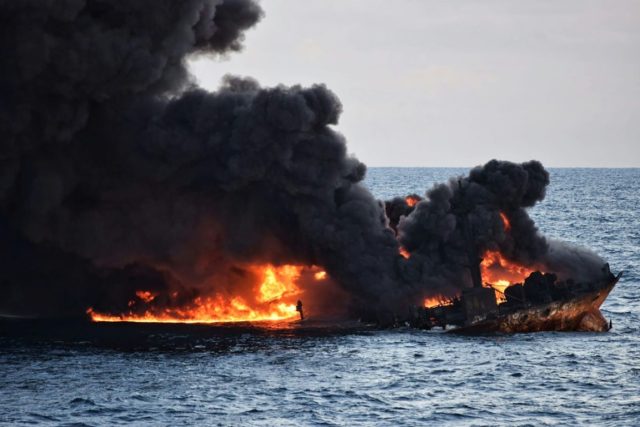The Iranian oil tanker Sanchi is leaking heavy bunker fuel through a massive hole in its side, recovery operation leaders confirmed this week, after exploding and sinking into the East China Sea carrying its fuel and a large shipment of the lighter petroleum product condensate.
The Sanchi, a ship owned by the National Iranian Tanker Company but waving a Panamanian flag, was shipping the condensate to South Korea when it crashed into another ship in the waters between Japan and China on January 6. It has since exploded, presumably killing the 32 crew members on board, and sunk into the sea. Recovery teams have found only three bodies.
Chinese rescuers are now scrambling to prevent the Sanchi from continuing to pollute the area. On Thursday, reports indicated that the combined area of the multiple oil slicks the Sanchi has created in the East China Sea was roughly the size of Paris.
On Sunday, Chinese officials confirmed that the area had since tripled in size.
China’s State Oceanic Administration officials confirmed Sunday that they had spotted three major oil slicks caused by the tanker totaling 128 square miles in size. On Wednesday, those three slicks were found to take up 101 square miles, according to the Agence-France Presse.
The Sanchi threatens the East China Sea in two ways: its condensate, while lighter than crude oil, is toxic to marine life; and the bunker fuel the ship was using to navigate is thicker and far more dangerous to the environment. The explosion that triggered the ship’s sinking made it nearly impossible for the ship not to leak its bunker fuel.
The South China Morning Post reports Tuesday that Chinese recovery teams have, indeed, found a large hole in the ship that is leaking, “but authorities remained uncertain over how best to tackle the source of the leak.” At least one Chinese official has argued that the only way to stop the leak is to remove the ship from the ocean floor.
Officials have focused the operation on attempting to reduce the range of the oil slicks currently present, a difficult task given the mix of different fuels and the lightness of the condensate, which helps it spread. Authorities had initially expressed hope that much of the condensate burnt off the water during the week in which the Sanchi burned before it sank, but the ship was carrying 111,000 tons of the product.
“The spill will spread with ocean currents and the wind. It will take a very long time and be very difficult to treat,” Gong Yongjun, a maritime rescue specialist at Dalian Maritime University, told the Post.
International mainstream environmental groups have largely abstained from commenting on the incident or criticizing those responsible. The leftist group Greenpeace issued a report on animals in the area shortly after the crash that triggered the ship’s explosion and sinking, noting that the ship sank into a “maritime migration route” for a variety of marine life. Greenpeace China’s Facebook page at press time does not boast any updates on the event or action items pressuring the government’s involved to investigate the incident and prevent further destruction.
As China and Iran are both highly secretive governments, hopes for a transparent investigation into how the crash and subsequent oil spill occurred are low. Chinese rescuers have, however, recovered the ship’s black box, according to Iranian media.
“As there were no similar incidents in history, we have no rescue practice or experience to follow, posing huge difficulties for the rescue,” Chinese Transport Ministry official Zhi Guanglu told reporters on Saturday. “We will continue investigations in accordance with international treaties and laws, and keep close contact with all sides.”
Zhi had referred to the incident as having “no precedent” on Friday.
Iranian state propaganda outlet PressTV published a story Monday citing a Chinese expert who claimed that the East China Sea’s waters “have been so denuded over the last three decades that fishermen normally bypass the area and go further afield for a bigger catch,” suggesting the oil spill may not affect fishing as much as environmental groups have warned.
PressTV claims that expert He Pemin’s remark suggests that concerns that the Sanchi is causing an environmental disaster are “misplaced” and that Iranian officials believe the Sanchi met “world-class standards.”

COMMENTS
Please let us know if you're having issues with commenting.